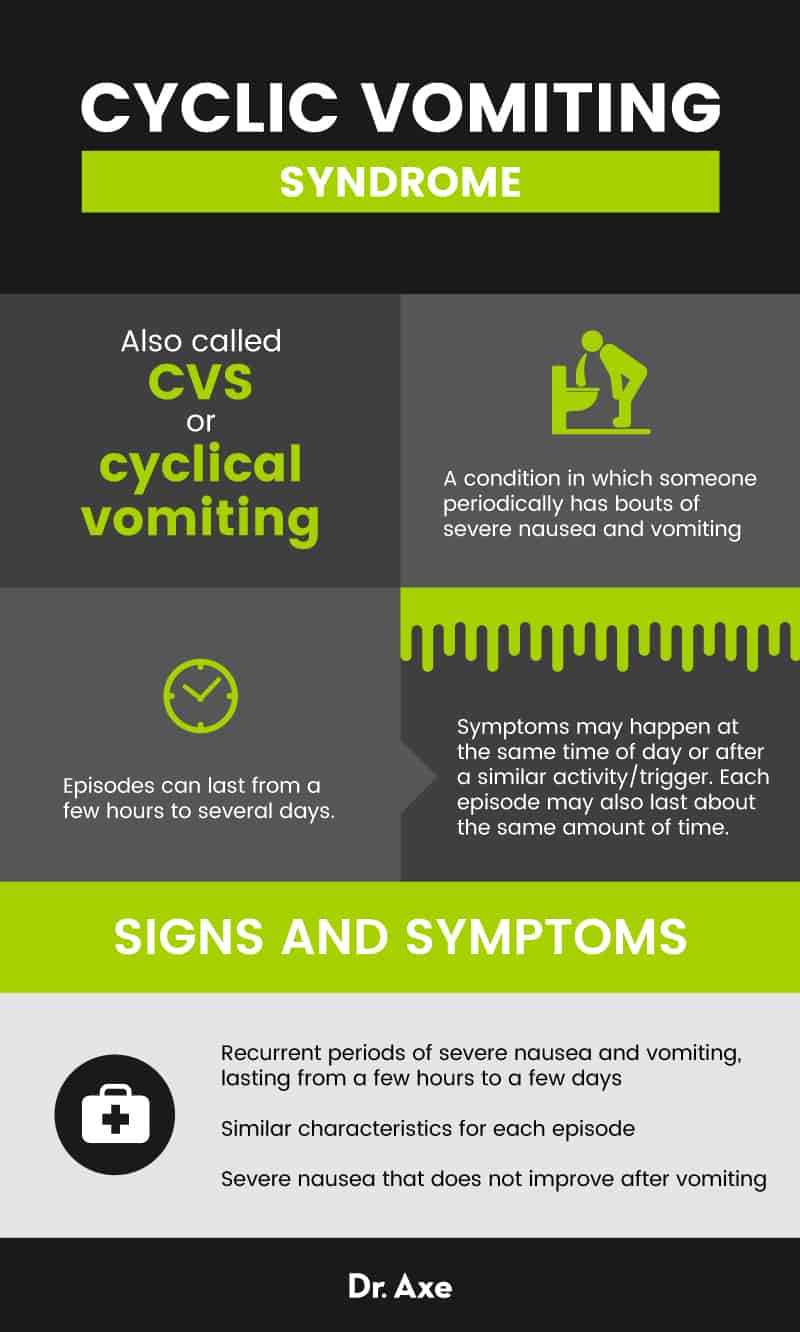The Facts About Cyclic Vomiting Syndrome: Symptoms, Causes, and Natural Remedies
Evidence Based
This Dr. Axe content is medically reviewed or fact checked to ensure factually accurate information.
With strict editorial sourcing guidelines, we only link to academic research institutions, reputable media sites and, when research is available, medically peer-reviewed studies. Note that the numbers in parentheses (1, 2, etc.) are clickable links to these studies.
The information in our articles is NOT intended to replace a one-on-one relationship with a qualified health care professional and is not intended as medical advice.
This article is based on scientific evidence, written by experts and fact checked by our trained editorial staff. Note that the numbers in parentheses (1, 2, etc.) are clickable links to medically peer-reviewed studies.
Our team includes licensed nutritionists and dietitians, certified health education specialists, as well as certified strength and conditioning specialists, personal trainers and corrective exercise specialists. Our team aims to be not only thorough with its research, but also objective and unbiased.
The information in our articles is NOT intended to replace a one-on-one relationship with a qualified health care professional and is not intended as medical advice.
September 26, 2018

Cyclic vomiting syndrome, or cyclical vomiting, is a rare illness that causes episodes of severe nausea and vomiting. In between the episodes, most people are symptom-free. Although the cause of the condition is not yet known, many people have triggers that they can learn to avoid and symptoms they can manage with natural remedies.
What Is Cyclic Vomiting Syndrome?
Cyclic vomiting syndrome (also called CVS) is a condition in which someone periodically has bouts of severe nausea and vomiting. In general, they feel well in between episodes, which can last from a few hours to several days. In addition, individuals tend to have similar episode characteristics each time they experience a bout of nausea/vomiting with cyclic vomiting syndrome. For example, the symptoms may happen at the same time of day or after a similar activity or trigger. Each episode may also last about the same amount of time. Unfortunately, episodes of nausea and vomiting can be debilitating, making it nearly impossible for people with the condition to take part in regular activities until symptoms subside.
Cyclic vomiting syndrome typically begins in childhood. However, adults may develop the condition, and it is becoming more common in adults over time. It may be defined as having three or more episodes in a six-month period with no apparent cause, or having five or more episodes ever. (1) For most people, the problem resolves in a few months to a few years, but some people have the condition for decades.
The condition is rare and can be a challenge to diagnose because nausea and vomiting are common symptoms for many other illnesses. Cyclic vomiting syndrome may be hard to distinguish from abdominal migraines or cannabis hyperemesis syndrome — a condition caused by chronic marijuana use that also results in excessive nausea and vomiting.
Children with cyclic vomiting syndrome often outgrow the condition but are then more likely to develop migraines as adults.
Ad


Signs and Symptoms
Signs and symptoms of cyclic vomiting syndrome include: (2)
- Recurrent periods of severe nausea and vomiting, lasting from a few hours to a few days (Attacks tend to last longer in adults than in children.)
- Similar characteristics for each episode (This may include time of day, how long they last, severity, other symptoms that happen at the same time and circumstances that came just before the episode. Many people have the episodes early in the morning.)
- Severe nausea that does not improve after vomiting
- Dry heaving often continues even after the stomach is emptied.
- In children, projectile vomiting and bouts of rapid-fire vomiting can happen. Vomiting may occur several times per hour, or even every few minutes for children.
During an episode, symptoms may also include: (1, 2)
- Excessive sweating
- Compulsively drinking water to try to dilute stomach bile and make vomiting easier
- Pale skin
- Lack of energy, inability to walk around
- Social withdrawal
- Appearing almost unconscious
- Drooling
- Fever
- Green or yellow color to the vomit
- Gagging
- Diarrhea
- Severe stomach pain
- Loss of appetite
- Headaches
- Sensitivity to light and sound
- Dizziness or light-headedness
- Dehydration or weight loss
Cyclic Vomiting Syndrome Causes and Risk Factors
There is no known cause for cyclic vomiting syndrome. Some research indicates the problem may be related to a miscommunication disorder between the brain and the gut. However, many people with the condition can pick out a trigger or a set of circumstances that precede the episodes. These triggers may cause an episode of vomiting to start.
Cyclic vomiting syndrome (CVS) is a rare disorder characterized by recurrent episodes of severe vomiting, often accompanied by nausea, abdominal pain, and other symptoms. The exact cause of CVS is not fully understood, but it is believed to be related to abnormalities in the brain-gut axis, leading to dysfunction in the regulation of the digestive system. There are various triggers and risk factors associated with CVS, as well as conventional treatment options and natural remedies that can help manage the condition.
Common triggers for CVS include excitement or stress, particularly in young children, stress, anxiety or panic attacks in adults, certain foods such as MSG, chocolate, caffeine, and cheese, overeating, eating right before bed, fasting, physical exhaustion, heavy exercise, lack of sleep, menstruation, motion sickness, weather changes, hot weather, allergies or sinus issues, and colds or infections. Identifying and avoiding these triggers can help prevent episodes of vomiting in individuals with CVS.
Risk factors for CVS include having migraines, a family history of migraines, anxiety or panic disorders, being female (although only a slight increase in risk compared to males), being a child between three and seven years old, and having gastroesophageal reflux. These factors can increase the likelihood of developing CVS and may require additional management strategies.
Diagnosing CVS can be challenging, as there is no specific test for the condition. Doctors typically rely on a thorough medical history, physical examination, and ruling out other potential causes of recurrent vomiting. Tests such as blood work, imaging studies, and motility tests may be ordered to help confirm a diagnosis of CVS.
Conventional treatment for CVS often involves using medications to alleviate symptoms and prevent vomiting episodes. Options may include drugs to relieve nausea or pain, antiemetics to prevent vomiting, medications to suppress seizures or stomach acid, antidepressants, and migraine drugs. During episodes, individuals may require hospitalization for intravenous fluids, pain relief, and anti-nausea medications to manage dehydration and other symptoms.
In addition to conventional treatment, there are natural remedies that can help individuals manage CVS and reduce the frequency and severity of vomiting episodes. These may include identifying and avoiding triggers, using natural remedies for migraines and nausea, staying hydrated, resting, and eating bland foods during episodes, and recovering with clear liquids and electrolyte drinks after an episode ends. Consulting with a healthcare professional before making any changes to your diet or lifestyle is recommended to ensure safe and effective management of CVS.
Overall, cyclic vomiting syndrome can be a challenging and distressing condition to live with, but with proper management strategies and support from healthcare providers, individuals with CVS can lead fulfilling lives and reduce the impact of recurrent vomiting episodes on their overall well-being. Cyclic Vomiting Syndrome (CVS) is a rare condition characterized by recurrent episodes of severe vomiting. These episodes can be debilitating and significantly impact a person’s quality of life. While the exact cause of CVS is not fully understood, there are several natural remedies and lifestyle changes that can help manage the symptoms and reduce the frequency of episodes.
One natural remedy that has shown promise in managing CVS is the use of supplements. Co-enzyme Q10, riboflavin, and L-carnitine have been studied for their potential benefits in people with CVS. Co-enzyme Q10 helps cells move energy and clear waste, while L-carnitine increases the length of time between episodes. Studies have shown that a combination of these supplements may be even more effective in reducing the number and severity of CVS episodes.
In addition to supplements, managing emotional stress is crucial for individuals with CVS. Emotional stress, both positive and negative, can trigger episodes of vomiting. It is important to minimize stress through techniques such as cognitive behavioral therapy, biofeedback, and stress management strategies. Finding relaxation techniques that work for you, such as deep breathing, meditation, or spending time with loved ones, can help reduce the impact of stress on CVS episodes.
Getting plenty of rest is another key factor in managing CVS. Physical exhaustion can trigger episodes, so it is important to prioritize sleep and rest. Adequate sleep, rest during episodes, and avoiding excessive exertion can help prevent episodes of vomiting. It is important to listen to your body and give yourself the time and rest needed to recover from physical or emotional stressors.
It is essential to consult with a healthcare provider if you suspect you or your child has symptoms of CVS. Proper diagnosis and treatment are crucial in managing this condition. In severe cases, emergency medical care may be necessary to prevent dehydration and manage symptoms. It is important to follow your healthcare provider’s instructions for treating CVS episodes and not to take any herbs, supplements, or medications without their advice.
Overall, managing CVS requires a comprehensive approach that includes natural remedies, lifestyle changes, and proper medical care. By incorporating supplements, managing stress, getting enough rest, and seeking medical guidance, individuals with CVS can effectively manage their symptoms and improve their quality of life. Natural remedies are often seen as a safe and effective alternative to conventional medication. However, it is important to remember that even natural remedies can have interactions with medication or cause serious side effects. This is particularly important to consider when dealing with conditions like cyclic vomiting syndrome (CVS).
CVS is a rare condition that causes occasional episodes of repeated vomiting. These episodes usually have a trigger and other characteristics that are consistent, such as the time of day they occur or how long they last. While the true cause of CVS is unknown, it is believed to be related to a problem in communication between the gut and the brain. Episodes are often triggered by emotional stress or anxiety, and the condition is more common in individuals with migraines or a family history of migraines.
Symptoms of CVS include severe nausea and vomiting that can last for hours to several days. During these episodes, individuals with CVS may be incapacitated and unable to function normally. Conventional medical treatment for CVS may involve medications to address symptoms like migraines, seizures, depression, nausea, and vomiting. While some medications can be taken to prevent episodes, most are administered once an episode begins to alleviate or stop symptoms.
For those seeking natural treatment options for CVS, there are several strategies to consider. Identifying and avoiding triggers that can lead to episodes is essential. Additionally, managing symptoms during an episode is crucial. Some individuals have found relief from CVS symptoms by incorporating supplements like coenzyme Q10 or L-carnitine into their routine. Minimizing emotional stress and ensuring plenty of rest can also be beneficial in managing CVS.
It is important to consult with a healthcare provider before starting any natural remedies for CVS, as they may interact with existing medications or exacerbate symptoms. By working closely with a medical professional, individuals with CVS can develop a comprehensive treatment plan that addresses their unique needs and helps them manage their condition effectively. Remember, even natural remedies should be approached with caution and under the guidance of a healthcare provider to ensure safety and efficacy. the topic of the impact of social media on mental health
In today’s digital age, social media has become an integral part of our daily lives. With platforms like Facebook, Instagram, Twitter, and TikTok dominating our online interactions, it’s no surprise that social media has a significant impact on our mental health.
While social media can be a great tool for staying connected with friends and family, sharing updates, and discovering new content, it also has its downsides. Studies have shown that excessive use of social media can lead to feelings of loneliness, anxiety, depression, and low self-esteem.
One of the main reasons why social media has a negative impact on mental health is the constant comparison to others. When scrolling through our feeds, we are bombarded with images of people living seemingly perfect lives – traveling to exotic destinations, dining at fancy restaurants, and showing off their flawless bodies. This can create unrealistic expectations and feelings of inadequacy in our own lives, leading to a decrease in self-worth and confidence.
Additionally, social media can also be a breeding ground for cyberbullying and harassment. With the anonymity that comes with online interactions, people feel emboldened to say hurtful things that they wouldn’t say in person. This can have a devastating impact on the mental health of those on the receiving end, leading to feelings of shame, embarrassment, and isolation.
Furthermore, the constant need for validation through likes, comments, and shares can create a cycle of addiction, where individuals feel the need to constantly check their social media accounts for affirmation. This can lead to feelings of anxiety and stress, as well as a decrease in productivity and real-life interactions.
So, what can be done to mitigate the negative impact of social media on mental health? Firstly, it’s important to be mindful of your social media usage and set boundaries for yourself. Limit the amount of time you spend on these platforms and take breaks when needed. It’s also helpful to curate your feed and unfollow accounts that make you feel bad about yourself.
Additionally, focus on building real-life connections and relationships. Take the time to connect with friends and family in person, engage in activities that bring you joy, and practice self-care techniques such as meditation, exercise, and journaling.
Lastly, seek professional help if you’re struggling with your mental health. Therapy, counseling, and support groups can provide you with the tools and resources to navigate the challenges of social media and improve your overall well-being.
In conclusion, while social media can be a powerful tool for communication and connection, it’s important to be aware of its potential impact on mental health. By being mindful of your usage, setting boundaries, and prioritizing real-life connections, you can mitigate the negative effects of social media and prioritize your mental well-being.


